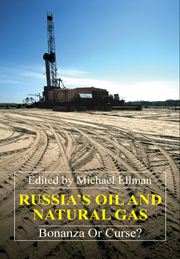Book contents
- Frontmatter
- Contents
- List of Tables and Figures
- Preface
- A Overview
- B Financial Flows
- 3 Price Differences, Taxes and the Stabilization Fund
- 4 Russia's Economic Contraction and Recovery 1992–2004: Compulsory Repatriation of Export Revenues and the Ambivalence of Liberalization
- C Economic Policy Issues
- D Political Issues
- List of Contributors
- Index
- More Titles in the Series
3 - Price Differences, Taxes and the Stabilization Fund
from B - Financial Flows
Published online by Cambridge University Press: 05 March 2012
- Frontmatter
- Contents
- List of Tables and Figures
- Preface
- A Overview
- B Financial Flows
- 3 Price Differences, Taxes and the Stabilization Fund
- 4 Russia's Economic Contraction and Recovery 1992–2004: Compulsory Repatriation of Export Revenues and the Ambivalence of Liberalization
- C Economic Policy Issues
- D Political Issues
- List of Contributors
- Index
- More Titles in the Series
Summary
The Hypothesis of ‘Subsidies’ Caused by Price Differences
This chapter analyses some financial aspects of the Russian oil and gas industries under circumstances of a rapid increase in oil and gas export revenues (Table 3.1). It begins by considering the following hypothesis: domestic users of oil are receiving ‘subsidies’, because domestic oil prices have not risen sharply in comparison with world prices. Hence domestic non-energy producers are receiving assistance from the oil and gas industries which helps their international competitiveness and restricts the spread of the Dutch disease in contrast to the depression of the 1990s (Tabata, 2000).
The difference between world market prices and domestic purchasers' prices of crude oil increased from USD 5.2 per barrel in 1998 to USD17.2 per barrel in 2004 (Figure 3.1). We can therefore deduce that domestic users of crude oil received huge subsidies. Since domestic users of crude oil are limited to consumers in the oil-refining industry, prices of petroleum products are examined in the next section.
The Case of Petroleum Products
Curiously, we can see in Figures 3.2 and 3.3 that domestic purchasers' prices are higher than export prices in the case of gasoline and diesel fuel, while in the case of heavy fuel oil, export prices have been higher than purchasers' prices since 1998 (Figure 3.4). This is due to the domestic taxation on petroleum products. Value-added taxes (VAT) and excises have been levied on domestic purchases of petroleum products, while exports to non-CIS countries have been exempted from these taxes.
- Type
- Chapter
- Information
- Russia's Oil and Natural GasBonanza or Curse?, pp. 35 - 54Publisher: Anthem PressPrint publication year: 2006
- 9
- Cited by



